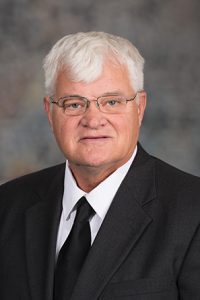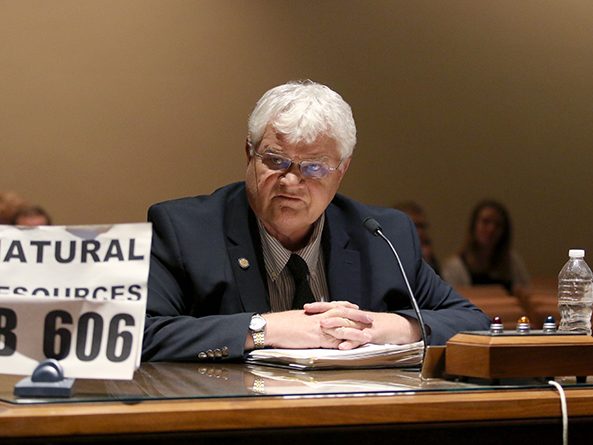Sale of streamflow augmentation project land considered
The Natural Resources Committee heard testimony March 13 on a bill that would authorize natural resources districts to sell land originally acquired for a water augmentation project while retaining the right to use groundwater beneath that land.
Introduced by North Platte Sen. Mike Groene, LB606 would authorize each natural resources district to develop water augmentation projects for streamflow enhancement and to acquire real property for those projects. The governing NRD would be required to allocate the amount of groundwater that may be withdrawn for the project.
After the project has been developed, the project’s owner could sell the property and continue to pump the groundwater necessary for augmentation without regard to the land area or acres owned.
Groene said the bill would put into law what has been done already by four of the state’s NRDs when they created an interlocal agency called N-CORPE (Nebraska Cooperative Republican Platte Enhancement) in 2012.
N-CORPE bought approximately 20,000 acres of land in Lincoln County and retired most of it from irrigation so that it could pump groundwater from the Ogallala Aquifer into the Republican and Platte rivers. This helps the state meet streamflow requirements under a Colorado, Kansas and Nebraska water use compact as well as a federal and state plan to preserve wildlife habitat along the central Platte River.
The Upper Republican NRD bought land in Dundy County near the headwaters of Rock Creek for the same purpose.
Groene said Nebraska’s common law does not allow water rights to be transferred from the overlying land, but several Nebraska Supreme Court rulings infer that the Legislature has the power to make exceptions to that rule.
“As a result of passage of LB606,” he said, “an NRD operating an augmentation project will become a peculiar type of landowner granted very special status with statutory rights contravening common law.”
Groene said the proposal would assure N-CORPE board members that they could sell the land in Lincoln County without jeopardizing the project. The sale could generate up to $20 million that could be used to pay off the bond used to purchase the land, he said. It also would eliminate much of the project’s annual operating cost, Groene said, which would allow for a reduction in its main funding source, a $10 per acre occupation tax on irrigated farm land within the four participating NRDs.
Additionally, Groene said, returning the land to private ownership would boost the area’s economy by generating additional property tax revenue for Lincoln County.
A law passed by the Legislature last year allows NRDs and interlocal entities that buy land for an augmentation project to make voluntary payments to counties in lieu of taxes up to the amount that would have been paid if the land were subject to taxation.
Ken Anderson, a Lincoln County resident, testified in support of LB606. He said the augmentation project has cost the county a significant amount of property tax revenue. The bill would allow for the land to be returned to the tax roll without harming the project, Anderson said.
Dan Estermann, a Lincoln County rancher and Middle Republican NRD board member, testified in support of the bill on his own behalf. He agreed that LB606 would make it clear to board members that they could sell the land while maintaining the project. Cutting the N-CORPE project’s operating budget would make it easier to lower the occupation tax on irrigators, he added.
Jasper Fanning, general manager of the Upper Republican NRD, testified in opposition to the bill. He said LB606 would create new legal risks for the N-CORPE project rather than protecting it.
Over the next few years, Fanning said, it may be possible to maintain compact compliance with fewer retired irrigated acres. He said this would allow the NRDs to sell some of the N-CORPE property to private owners as irrigated land rather than dryland, as envisioned under LB606. N-CORPE could recoup more of its investment by selling the land at a higher value, Fanning said.
Even if the land is sold, Fanning added, the project still would need to maintain pipes and valves and pay other operating expenses, which he said would total approximately $400,000 per year. Project managers are seeking new ways to pay those expenses, Fanning said, such as leasing the land to renewable energy companies.
Jeff Fassett, director of the state Department of Natural Resources, gave neutral testimony on LB606. He said any change to state law that would allow for the sale of the land needs to be precise enough to ensure that the N-CORPE project can continue. The state attorney general’s office is concerned that LB606 as introduced poses some risk of litigation, Fassett said, and the department’s attorney believes it could have a “ricocheting effect” on state water law.
“The value of this particular project—along with Rock Creek and the other management actions the NRDs are investing in—is absolutely what’s keeping the state in compliance with our relationship to Kansas in the Republican River Compact,” he said. “That is something we do not want to place any risk on.”
The committee took no immediate action on the bill.


